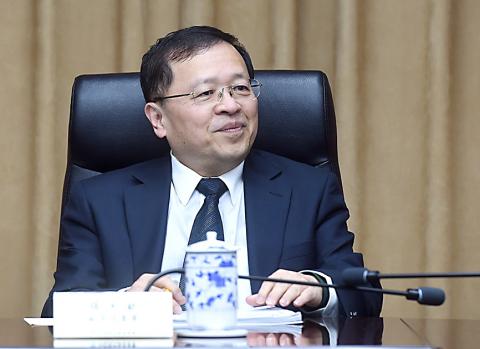The Transitional Justice Commission has said that it would establish a psychotherapy center for survivors of political repression as part of a pilot program.
Although martial law was lifted more than three decades ago, the need to provide psychotherapy to people suffering psychological trauma caused by political repression has remained unaddressed, the commission said.
Many survivors, their families, as well as family members of political victims, still suffer from psychological stresses caused by traumatic memories, it said.

Photo: Chien Jung-fong, Taipei Times
The commission said it has asked the National Property Administration for space in a government building that could be turned into a psychotherapy center dedicated to treating people with mental trauma caused by political repression.
The commission’s leading officials have met with Taiwan 228 Incident Care Association director-general Pan Hsin-hsing (潘信行) and 228 Memorial Foundation director Lin Li-tsai (林黎彩) to promote the program.
Family members of political victims were pleased with the plan and urged the commission to follow it through, the commission said.
“Efforts to make psychotherapy available to people suffering from trauma related to political repression is one of the commission’s key tasks,” commission deputy chairman Chang Tien-chin (張天欽) said.
While the commission has yet to announce a date for the opening of the center, it expects to provide treatment to 3,000 to 5,000 people, including survivors of political repression, their families and family members of political repression victims, as well as guilt-ridden perpetrators, he said.
There are examples in other countries in which perpetrators suffer from long-term sleeping disorders due to feelings of guilt, a commission member said.
The nation should have an independent psychotherapy center exclusively dedicated to people traumatized by political repression, rather than offering such services at local hospitals and clinics, the commission said.
Professionals at the center would contact survivors of political repression, their families and family members of political victims by telephone to inquire if they need therapy, and encourage them to seek help for any trauma-related conditions, it said.
In Germany, where similar services are available, patients first see a psychiatrist, who makes a diagnosis and decides whether to transfer the patient to a therapist, said a commission member who declined to be named.
The commission is still planning the program and has yet to decide whether to adopt procedures similar to Germany’s, they said.
After the pilot program’s conclusion, the commission would establish a policy for a long-term psychotherapy program to allow the Ministry of Health and Welfare to take over, they added.

A Ministry of Foreign Affairs official yesterday said that a delegation that visited China for an APEC meeting did not receive any kind of treatment that downgraded Taiwan’s sovereignty. Department of International Organizations Director-General Jonathan Sun (孫儉元) said that he and a group of ministry officials visited Shenzhen, China, to attend the APEC Informal Senior Officials’ Meeting last month. The trip went “smoothly and safely” for all Taiwanese delegates, as the Chinese side arranged the trip in accordance with long-standing practices, Sun said at the ministry’s weekly briefing. The Taiwanese group did not encounter any political suppression, he said. Sun made the remarks when

The Taiwanese passport ranked 33rd in a global listing of passports by convenience this month, rising three places from last month’s ranking, but matching its position in January last year. The Henley Passport Index, an international ranking of passports by the number of designations its holder can travel to without a visa, showed that the Taiwan passport enables holders to travel to 139 countries and territories without a visa. Singapore’s passport was ranked the most powerful with visa-free access to 192 destinations out of 227, according to the index published on Tuesday by UK-based migration investment consultancy firm Henley and Partners. Japan’s and

BROAD AGREEMENT: The two are nearing a trade deal to reduce Taiwan’s tariff to 15% and a commitment for TSMC to build five more fabs, a ‘New York Times’ report said Taiwan and the US have reached a broad consensus on a trade deal, the Executive Yuan’s Office of Trade Negotiations said yesterday, after a report said that Washington is set to reduce Taiwan’s tariff rate to 15 percent. The New York Times on Monday reported that the two nations are nearing a trade deal to reduce Taiwan’s tariff rate to 15 percent and commit Taiwan Semiconductor Manufacturing Co (TSMC, 台積電) to building at least five more facilities in the US. “The agreement, which has been under negotiation for months, is being legally scrubbed and could be announced this month,” the paper said,

NATIONAL SECURITY THREAT: An official said that Guan Guan’s comments had gone beyond the threshold of free speech, as she advocated for the destruction of the ROC China-born media influencer Guan Guan’s (關關) residency permit has been revoked for repeatedly posting pro-China content that threatens national security, the National Immigration Agency said yesterday. Guan Guan has said many controversial things in her videos posted to Douyin (抖音), including “the red flag will soon be painted all over Taiwan” and “Taiwan is an inseparable part of China,” while expressing hope for expedited “reunification.” The agency received multiple reports alleging that Guan Guan had advocated for armed reunification last year. After investigating, the agency last month issued a notice requiring her to appear and account for her actions. Guan Guan appeared as required,